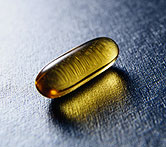
MONDAY, Nov. 5 (HealthDay News) — A hoped-for effect of fish oil supplements in preventing an irregular heartbeat that often follows heart surgery did not materialize in a major new trial.
Fish oil capsules with omega-3 fatty acids given in the days before and after surgery failed to stop the post-op onset of atrial fibrillation, a heart arrhythmia that can raise patients’ odds for stroke.
The international trial of more than 1,500 patients “is important to provide a definitive answer that [fish oil] does not reduce atrial fibrillation in that setting,” said study lead author Dr. Dariush Mozaffarian, an associate professor of medicine at the Harvard School of Public Health, in Boston.
His team presented the findings Monday in Los Angeles at the annual meeting of the American Heart Association. They are also being published simultaneously online Nov. 5 in the Journal of the American Medical Association.
The omega-3 fatty acids found in fish oil have become popular supplements due to their supposed beneficial effect on health. According to preventive cardiologist Dr. Suzanne Steinbaum at Lenox Hill Hospital in New York City, the omega-3 in fish oil has also “been associated with anti-arrhythmic effects,” helping to keep the heart’s rhythm regular.
“About one in three patients do have atrial fibrillation after undergoing cardiac surgery, which often results in long hospital stays,” Steinbaum noted, so it was reasonable to wonder if giving patients short-term doses of fish oil might reduce their risk.
In the new study, Mozaffarian and colleagues recruited 1,516 cardiac surgery patients, average age 64, from the United States, Italy and Argentina. For between three to five days prior to their scheduled heart surgeries, the patients got either fish oil capsules or an inactive placebo, and were also given double the amount of the capsules after their surgeries — until post-surgery hospital discharge or 10 days, whichever came first.
The fish oil seemed to have no effect on whether or not the patient developed atrial fibrillation after the surgery, the team reported. Speaking at an AHA press briefing, study co-author Dr. Roberto Marchioli stressed that this doesn’t mean that omega-3 fatty acids don’t help the heart more generally.
“In this setting, omega-3 fatty acids may simply not have enough power to be effective in preventing arrhythmias,” said Marchioli, a cardiologist at the Consorzio Mario Negri Sud in Santa Maria Imbaro, Italy.
Another cardiologist agreed that fish oil may have its limits.
“The medical literature is becoming more suggestive that omega-3 supplements may be a somewhat helpful, safe and additive health strategy in general terms but not a definite cardio-protective treatment,” said Dr. David Friedman, chief of heart failure services at North Shore-LIJ’s Plainview Hospital in Plainview, N.Y.
Mozaffarian did note one silver lining from the study for patients, however.
“Fish oil is safe in this setting — there was no evidence for increased bleeding, in fact there was a decrease in bleeding,” he said. That’s important, because “many surgeons now recommend that patients stop their fish oil before cardiac surgery,” Mozaffarian pointed out. “This is by far the largest trial of fish oil in cardiac surgery, so our data suggests that it’s safe to use your fish oil in cardiac surgery.”
Mozaffarian also said that whatever power fish oil might have in influencing outcomes for very sick heart patients may be obscured by the fact that most of these patients are also taking multiple medicines, clouding the results of any short-term study.
Over the longer term, and for healthier people, omega-3s probably do have some heart-healthy benefit, Mozaffarian said.
“If you put together all of the observational studies and all of the trials, I think there’s evidence that some fish or fish oil intake compared to none reduces death from heart disease,” he said.
More information
Find out more about atrial fibrillation at the U.S. National Heart, Lung, and Blood Institute.

